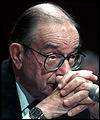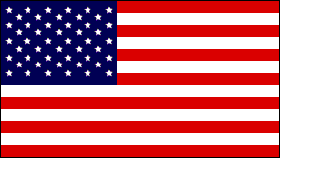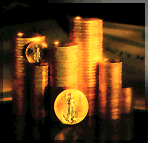Financial Crisis Update

http://www.usatoday.com/money/djia.gif
![]() How To Prepare For The Coming Stock
Market Crash
How To Prepare For The Coming Stock
Market Crash ![]()
Thu 17 June 1999
USA: CNN

"developing imbalances" threaten the U.S.
Federal Reserve Chairman Alan Greenspan Thursday cited "developing imbalances" that threaten the U.S. economy in what economists believe is a hint that the central bank will raise interest rates later this month. "He's preparing the market for a rate hike, and possibly more than one down the road," Palombi said. "He's highlighting the need for the Fed to be pre-emptive against inflation -- and part of that may involve reversing last fall's rate cuts." Full Story.
Fri 11 June 1999
USA: Nando Times

U.S. wholesale prices rose steadily in May
U.S. wholesale prices rose steadily in May and retail sales boomed at the fastest clip in three months, the government said Friday, amid growing worry that higher interest rates lie ahead. The retail sales report heightened concern the Federal Reserve might soon cool demand by raising official interest rates. "The retail sales report provided more support for the view that the 'cake is baked' in terms of the next Fed decisions," said economist Lynn Reaser of Bank of America Private Bank in Jacksonville, Fla. Full Story.
Wed 9 June 1999
USA: Nando Times

U.S. overheating could endanger world economy, central bankers say
Record trade imbalances between major industrial countries must sooner or later bring a weaker dollar, while a potential overheating of the U.S. economy poses a danger to the world economy, says a central bankers' report released Monday. Trade imbalances "must at some point imply a lower dollar and an appreciation in the yen and the euro," the BIS report said. It said the "downside potential for the global economy is obvious" if the dollar weakens against the euro and the yen before the Japanese and European economies recover. The report said U.S. interest rate cuts made last year to calm turbulent world financial markets may have to be reversed. The possibility that the U.S. economy will overheat and trigger a stock market slump as investors anticipate a future recession poses a "great danger" to the world economy, it said. Full Story.
Tue 8 June 1999
USA: Nando Times

Consumer borrowing rose in April, fueled by credit card use
Americans' rate of borrowing rose in April, propelled by heavy credit card use. Consumers' credit outstanding, excluding mortgage debt, advanced at a 3.4 percent annual rate in April to a seasonally adjusted $1.33 trillion, the Federal Reserve said Monday. Full Story.
Tue 25 May 1999
USA: Yahoo! News

Greenspan Links Spending, Wealth Effect, Shop 'Till You Drop!
Federal Reserve Chairman Alan Greenspan said Monday that U.S. consumers were using capital gains from both the stock market and equity built up in their homes to fuel strong spending. He noted that incomes were rising "fairly solidly,'' but the increases in purchasing were far outpacing those gains. "As a consequence, the amount of saving has not only gone down, but now has turned negative,'' Greenspan told the National Retail Federation. He was referring to statistics from the U.S. Commerce Department showing that in the first quarter, the personal saving rate fell to negative 0.5 percent, the lowest since record-keeping began in 1946. That suggested consumers were drawing down their savings to finance spending. Full Story.
Mon 24 May 1999
Britain: BBC

UK economy at a standstill
The UK economy failed to grow at all in the first quarter of 1999. This has raised fears of a recession - and hopes of an interest rate cut by the Bank of England. Financial and business services led the slowdown. The manufacturing sector, which only makes up one-fifth of the economy, is still in recession, with a decline of 0.3% for the quarter and 1.2% for the year as a whole. Full Story.
Wed 19 May 1999
World: CNN

Gold price at 20-year low. Time to Buy!
Fears of further central bank sales send bullion below $273 an ounce in London. Some
analysts said the drop in gold prices defied logic. Gary Mead, the head of research at the
World Gold Council in London, said annual demand of gold has actually exceeded total mine
production by 1,119 metric tons a year. The differential has been covered by recycled
scrap and net sales from central banks. Mead and other suggest that the gold market is
especially vulnerable to psychological pressure. "The Bank of England is selling, so
everyone is running to the exits," he said. Mead said that of the estimated 134,000
metric tons of gold reserves currently above ground, only 34,000 tons are in the so-called
"official," or central bank, sector. Full Story.
Mon 17 May 1999
World: CNN

Y2K could create a world of problems for U.N.
To plan for possible Y2K-related bank failures, the United Nations is setting up special accounts so that hundreds of its missions don't run out of money. U.N. officials say communications are a major concern. Satellites and telephones link the United Nations to its staff overseas, and a small computer problem in one country could have international repercussions. The same applies to banking in some of the 185 countries that belong to the United Nations, according to the Organization for Economic Cooperation and Development. "The OECD characterizes 50 percent of the countries' position as 'scary' -- a nonbureaucratic but very descriptive word," says Joseph Connor, undersecretary-general for administration and finance. Full Story.
Thu 6 May 1999
USA: ABC News

Greenspan Warns Of Risks To U.S. Economy
In his first extensive remarks on the economy in more than two months, Greenspan told a Chicago Fed conference that productivity growth had been a key factor in holding down U.S. inflation over recent years. But he warned against expecting the good times to last forever. "The performance of the American economy over the past seven years has been truly phenomenal,'' he said. "There are imbalances in our expansion that, unless redressed, will bring this long run of strong growth and low inflation to a close.'' Greenspan said it was almost impossible to predict for how much longer the booming U.S. economy could hold up the rest of the ailing world economy. The key for policymakers, therefore, was keep an open mind and react flexibly to economic change. Full Story.
Mon 3 May 1999
USA: Nando Times

Dow breaks 11,000 barrier. Up-Crash!
Two more reports of an ebullient economy pushed the Dow Jones industrial average past 11,000 Monday. The index of 30 blue chip stocks closed at 11,014.69, up 225.65 for the session and marking its fourth new high in five trading sessions. Even by the compressed standards of the modern stock market, the latest Dow milestone arrived with remarkable speed. The index closed at 10,000 on March 29, making Monday's close the fastest rise between 1,000-point markers in history. By comparison, it took four months, from October 1996 until February 1997, to move the Dow 16 percent from 6,000 to 7,000. "It is truly remarkable; it's breathtaking," said Hugh Johnson, market strategist at First Albany Corp. "I didn't suspect that I would be talking about Dow 11,000 this year, let alone at the beginning of May." Full Story.
Mon 3 May 1999
USA: Yahoo! News

U.S. Consumers Keep Up Spending Spree In March
U.S. consumers financed a spending spree that fueled vigorous first-quarter economic expansion by draining their savings throughout March, a government report showed Monday. The Commerce Department said that savings were withdrawn during March at an annualized rate of $36.1 billion. That followed huge drops in savings at rates of $37.3 billion in February and $19.4 billion in January. The strongest consumer spending in a decade was the key factor firing the economic surge at the beginning of 1999 and analysts say there is little reason to expect any sudden slackening. "With plenty of income and wealth to spend and jobs there for the taking, confidence is at record levels and that is why people are buying everything they can,'' said economist Joel Naroff of Naroff Economic Advisors in Holland, Pa. Full Story.
Tue 20 April 1999
USA: CNN

Trade deficit sets record
The United States trade deficit reached a record $19.4 billion in February, shattering the mark of $16.8 billion set in January, the Commerce Department reported Tuesday. The deficit was far wider than the $16.9 billion consensus forecast of analysts surveyed by Reuters. Imports soared to $96 billion from $93.9 billion, while exports shrank to $76.6 billion from $77.1 billion. Full Story.
![]() How To Prepare For The Coming Stock
Market Crash
How To Prepare For The Coming Stock
Market Crash ![]()
MORE FINANCIAL CRISIS INFORMATION
Last Updated on 06/17/99 by Darren Perkins
![]()